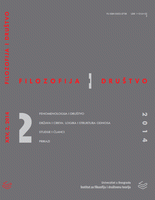Država i crkva u Francuskoj: društveno-istorijski kontekst, strukturna uslovljenost i karakter laiciteta
The French State And The Church: Socio-Historical Context, Structural Conditionality And Character Of Laicism
Author(s): Ivica MlađenovićSubject(s): Social Sciences
Published by: Institut za filozofiju i društvenu teoriju
Keywords: France; laicism; secularism; republic; nation; state; church; religion; separation
Summary/Abstract: In the article, the author deals with the political and social influences of the relationship between the state and religious communities in France. The first part of the paper is an analysis of historical context and the construction (evolution) of laicism in France through its local characteristics, values and social strengths, contributing to its formation. The fact that Catholic Church was one of the main legitimizing pillars of "the old regime", permanently determined the relationship between church and state, most importantly - it's subsequent social exclusion under the Republic. The 1789 French revolution in conjunction with the 1905 law on the Separation of church and state, up until present time, have been seen as the most important events in defining the relationship between political and religious entities in France. The second part of the paper continues in outlining the founding logic and principles of the contemporary relationship between religious communities and the French state. The article concludes in suggesting that through its persistence of a purely Laicistic model of state-church affiliation, view of the nation as a community of citizens, Weberian definition of the State, and the acceptance of the public sphere as common space in which communal interests are negated, France today represents an isolated island on the European continent.
Journal: Filozofija i društvo
- Issue Year: 25/2014
- Issue No: 2
- Page Range: 94-114
- Page Count: 21
- Language: Serbian

